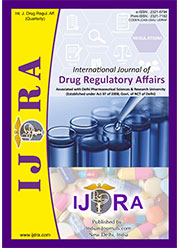MARKETING AUTHORIZATION OF GENERIC DRUG: GLOBAL ISSUE AND CHALLENGES
Abstract
Generic medicines are those whose patent protection has expired, and which may be produced by manufacturers other
than the innovator company. Use of generic medicines has been increasing in recent years, primarily as a cost saving
measure in healthcare provision. Generic medicines are typically 20 to 90% cheaper than originator equivalents. The
objective is to provide a high-level description of what generic medicines are and how they differ, at a regulatory and
legislative level, from originator medicines. It describes the current and historical regulation of medicines in the
world’s two main pharmaceutical markets, in addition to the similarities, as well as the differences, between generics
and their originator equivalents including the reasons for the cost differences seen between originator and generic
medicines. This article refers to the general generic drug approval process in India, USA, and Japan. They have
different regulation and approval process.
Downloads
References
Drugs. ON The Electronic Newsletter of
Pharmaceutical Technology. 2012. [Internet]. [cited
2013 June] Available from:
http://www.pharmtech.com/pharmtech/News/Global
-Market-Boom-for-GenericDrugs/ArticleStandard/Article/detail/756488
.
2. Srinivasan R. Indian pharmaceutical industry:
Evaluation of current scenario and future trends.
[Internet]. [cited 2012 August] Available from:
http://www.tejas-iimb.org/interviews/13.php .
3. Generic Drugs. [Internet]. [cited 2013 July]
Available from: http://www.who.int/trade
/glossary/story034/en/index.html
4. Bioequivalence Recommendations for Specific
Products [Internet]. [cited 2013 June] Available
from:
http://www.fda.gov/drugs/.../guidances/ucm075207.
htm
5. What Are Generic Drugs?. [Internet]. [cited 2013
June] Available from: http://www.fda.gov/Drugs
/ResourcesForYou/Consumers/BuyingUsingMedici
neSafely/UnderstandingGenericDrugs/ucm144456.h
tm website
6. Morton, FMS. (1998). Entry discussion in the
generic pharmaceutical industry. [Internet]. [cited
2013 January] Available from: http://som.yale.edu/
faculty/fms8/papers/genericentry.pdf
7. Mehl, A.B. (2006) . The Hatch Waxman Act and
market exclusivity for generic drug manufacturers.
[Internet]. [cited 2013 February] Available from:
http://lawreview.kentlaw.edu/articles/81-2/mehl.pdf
8. Rule 122-E, Drugs and cosmetics Act, 1954,
[Internet]. [cited 2013 September] Available from:
http://cdsco.nic.in/html/sec_122_A.html
9. Mathew Joe C, Roche’s cancer remedy loses new
drug status, Business Standard, [Internet]. [cited
2013 June] Available from:
http://www.businessstandard.com/india/news/roche%5Cs-cancer-drugloses-protection/382159/
(11 April 2012)
10. India will not provide data exclusivity, Business
Standard [Internet]. [cited 2013October] Available
from:
http://www.business-standard.com/india/news/indiawiil-not-provide-data-exclusivity-anandsharma/430285/
11. Guidance for Industry: 180-Day Generic Drug
Exclusivity Under the Hatch-Waxman Amendments
to the Federal Food, Drug, and Cosmetic Act,
(1998) FDA, Center for Drug Evaluation and
Research [Internet]. [Cited 2013 November]
Available from: http://www.fda.gov/cder/
guidance/2576fnl.pdf
12. Mirandah P, (2005) Bolar provisions in India’s
patent law [Internet]. [cited 2012 June] Available
from:
http://www.managingip.com/Article.aspx?ArticleID
=1254871
13. GaBI Online - Generics and Biosimilars Initiative.
Japanese guidelines for biosimilars [www.
gabionline.net]. Mol, Belgium: Pro Pharma
Communications International; [Internet]. [cited
2013 June]
Available from:
http://www.gabionline.net/Guidelines/Japaneseguidelines-for-biosimilars
14 Japan Pharmaceutical Manufacturers Association
(2007). Pharmaceutical Administration and
Regulation in Japan. [Internet]. [cited 2013 June]
Available from: http://www.jpma.or.jp/English/
parj/0607.html
15 Tamai, K. (2001). The experimental use exemption:
A Japanese prospective. [Internet]. [cited 2013
April] Available from: http://www.law.washington.
edu/casrip/symposium/number7/1-Tamai.pdf
The International Journal of Drug Regulatory affairs require a formal written transfer of copyright from the author(s) for each article published. We therefore ask you to complete and return this form, retaining a copy for your records. Your cooperation is essential and appreciated. Any delay will result in a delay in publication.
I/we have read and agree with the terms and conditions stated Page 2 of this agreement and I/we hereby confirm the transfer of all copyrights in and relating to the above-named manuscript, in all forms and media, now or hereafter known, to the International Journal of Drug Regulatory affairs, effective from the date stated below. I/we acknowledge that the IJDRA is relying on this agreement in publishing the above-named manuscript. However, this agreement will be null and void if the manuscript is not published in the IJDRA.
Download link for COPYRIGHT FORM







